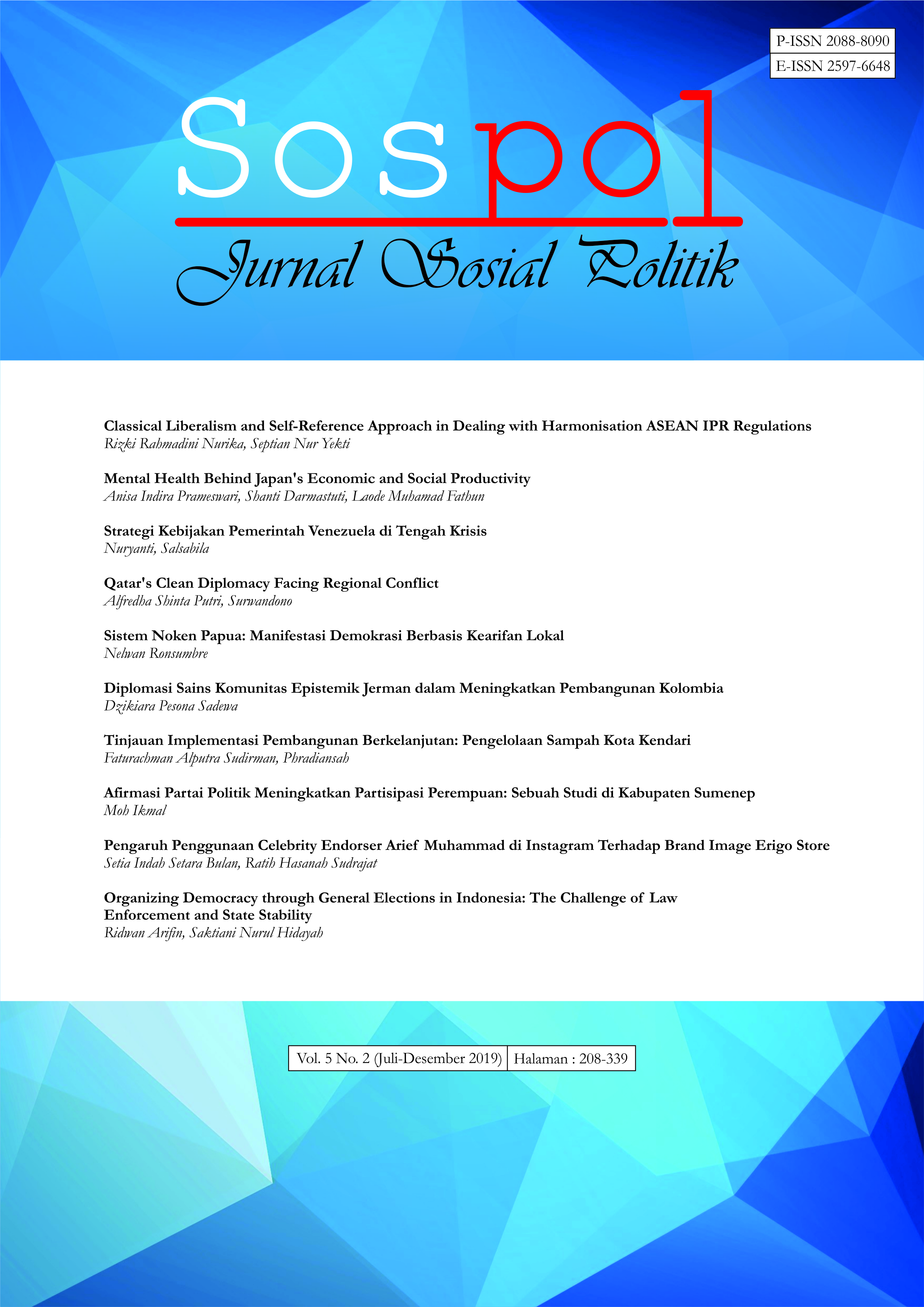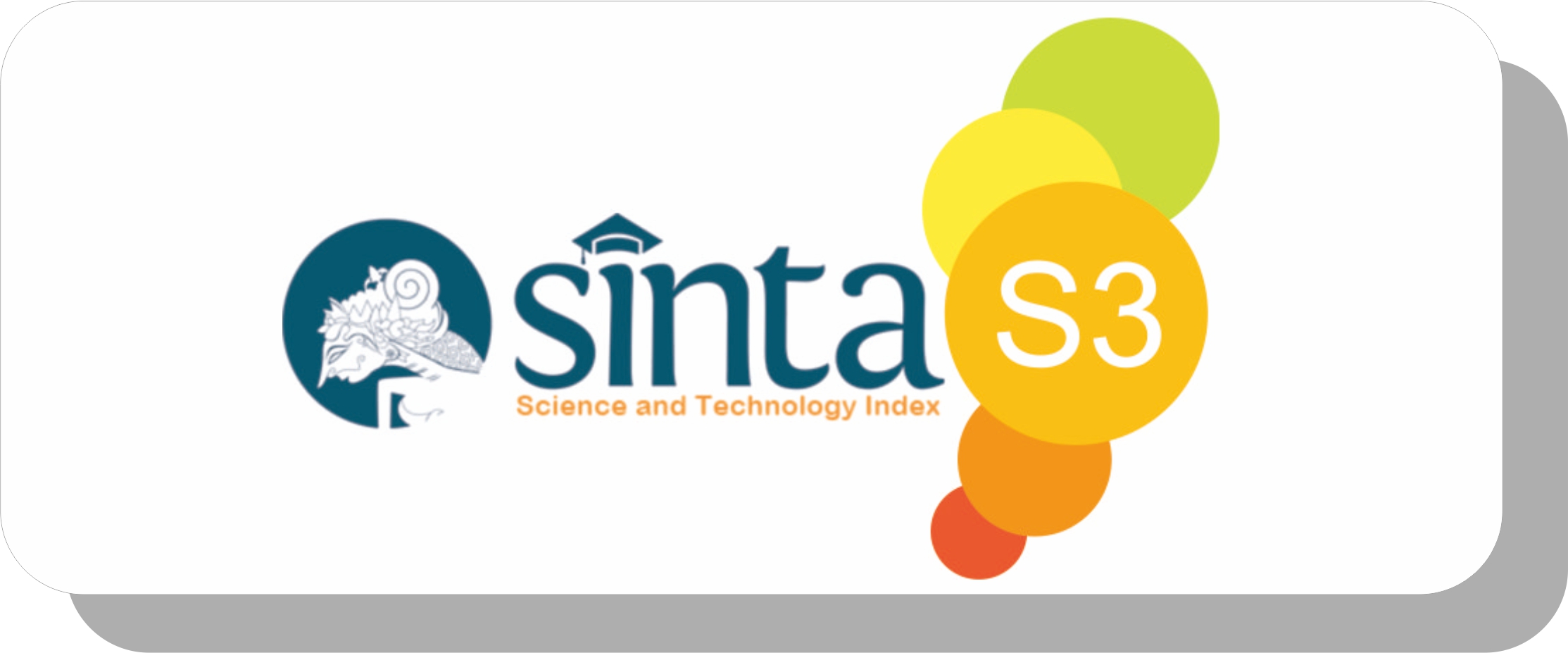Sistem Noken Papua: Manifestasi Demokrasi Berbasis Kearifan Lokal
DOI:
https://doi.org/10.22219/sospol.v5i2.7388Keywords:
Deliberative Democracy, Electoral System, Justice, Noken System, Political RightsAbstract
The noken system, particularly related to the model of electoral balloting in Papua Province, has become an eternal topic that has been discussed and debated. The main point of the discussion is at least two aspects, namely the implementation of the noken system which is considered as local wisdom and the manifestation of deliberative democracy and in other parts that the system is considered to violate the principles of freedom and political rights of citizens. This research is a qualitative research with three research objects, namely the electoral system, deliberative democracy and political rights of citizens. This research shows that the implementation of noken in Papua is legitimate in the legal term and culturally the practice of the system is inseparable part of local wisdom and the manifestation of deliberative democracy. This study recommends the need for adjustments between the election noken system and the principles of justice, freedom and political rights of citizens through synchronization and harmonization of legal products regarding the noken system with protection of human rights in addition to the need to make incremental improvements to the system.
Downloads
References
Bessette, J. M. (1980). Deliberative Democracy: The Majority Principle in Republican Government. Washington: American Enterprise Institute for Public Policy Research.
Dekme, D. (2015). Pengrajin Noken Pada Suku Bangsa Amungme di Desa Limau Asri Kecamatan Iwaka Kabupaten Mimika Provinsi Papua. HOLISTIK, Journal Of Social and Culture, 8(16), 1–12. Retrieved from https://ejournal.unsrat.ac.id/index.php/holistik/article/view/8672
Fadil, I. (2018). Anggota Bawaslu Papua nilai sistem noken perlu dievaluasi | merdeka.com. Retrieved October 29, 2019, from https://www.merdeka.com/politik/anggota-bawaslu-papua-nilai-sistem-noken-perlu-dievaluasi.html
Fatkhurohman. (2011). Mengukur Kesamaan Paham Demokrasi Deliberatif, Demokrasi Pancasila dan Demokrasi Konstitusional. Jurnal Konstitusi, IV(2), 37–58. Retrieved from https://media.neliti.com/media/publications/115251-ID-mengukur-kesamaan-paham-demokrasi-delibe.pdf
Gaffar, A. (1999). Politik Indonesia: Transisi Menuju Demokrasi. Yogyakarta: Yogyakarta: Pustaka Pelajar.
Haliim, W. (2016). Demokrasi Deliberatif Indonesia; Konsep Partisipasi Masyarakat dalam Membentuk Demokrasi dan Hukum yang Responsif. Masyarakat Indonesia, 42(Juni), 19–30. https://doi.org/10.14203/jmi.v42i1.556
Haryanto, A. (2016). Enam Kabupaten di Papua Akan Gunakan Sistem Noken - Tirto.ID. Retrieved October 29, 2019, from https://tirto.id/enam-kabupaten-di-papua-akan-gunakan-sistem-noken-bW1b
Jafrianto, J. (2016). Eksistensi Pemilihan dengan Model Kesepakatan Warga dalam Sistem Pemilihan Umum di Indonesia (Kajian Putusan Mahkamah Konstitusi Nomor 47-81/phpu.a-vii/2009 Tentang Perselisihan Hasil Pemilihan Umum). Jurnal Online Mahasiswa Fakultas Hukum Universitas Riau, III(2), 1–15. Retrieved from https://www.neliti.com/publications/187556/eksistensi-pemilihan-dengan-model-kesepakatan-warga-dalam-sistem-pemilihan-umum
Kadarsih, S., & Sudrajat, T. (2011). Aalisis Terhadap Hak Pilih TNI dan Polri dalam Pemilihan Umum. Jurnal Dinamika Hukum, 11(1), 48–61. https://doi.org/10.20884/1.jdh.2011.11.1.25
Katharina, R. (2017). Analisis terhadap Masalah Pilkada di Papua. Pusat Penelitian Badan Keahlian DPR RI, IX(06), 17–20. Retrieved from http://berkas.dpr.go.id/puslit/files/info_singkat/Info Singkat-IX-6-II-P3DI-Maret-2017-176.pdf
Kusuma, C. (2012). Demokrasi Deliberatif di Era Otonomi Daerah: Studi Kasus “Forum Konstituen” di Kabupaten Bandung (FISIP Universitas Indonesia). Retrieved from http://lib.ui.ac.id/file?file=digital/20301092-T30562-Candra Kusuma.pdf
Kymlicka, W. (2004). Pegantar Filsafat Politik Kontemporer: Kajian Khusus atas Teori-Teori Keadilan. Yogyakarta: Yogyakarta: Pustaka Pelajar.
Mahkamah Konstitusi RI. (2009). Risalah Sidang Perkara No. 47-81/PHPU.A-VII/2009 Perihal Perselisihan Hasil Pemilihan Umum Calon Anggota Dewan Perwakilan Daerah Provinsi Papua. Retrieved from https://mkri.id/public/content/persidangan/risalah/risalah_sidang_Putusan Perkara Nomor 47&81 PHPU.A VII-2009, 30 September 2009.pdf
Marit, E. L. (2018). Noken dan Perempuan Papua: Analisis Wacana Gender dan Ideologi. Melanesia : Jurnal Ilmiah Kajian Bahasa Dan Sastra, 1(1), 33. https://doi.org/10.30862/jm.v1i1.736
Muzaqqi, F. (2013). Diskursus Demokrasi Deliberatif di Indonesia. Jurnal Review Politik, 03(01), 123–139.
Pamungkas, S. (2015). Kajian Sistem Kepartaian, Sistem Pemilu dan Sistem Presidensil. Jakarta: Bagian Analisis Teknis Pengawasan Dan Potensi Pelanggaran. Jakarta: Bawaslu.
Pasaribu, K. (2013). Keputusan KPU Provinsi Papua No 1/Kpts/Kpuprov.030/2013 Tentang Juknis Tata Cara Pungut Hitung Suara Dengan Menggunakan Noken Sebagai Pengganti Kotak Suara Tahun 2013. Retrieved from Tambal Sulam Sistem Noken website: http://perludem.org/wp-content/plugins/download-attachments/includes/download.php?id=3585
Pasaribu, K. (2017). Tambal Sulam Sistem Noken Laporan Lanjutan Pilkada Serentak di Papua (Maharddhika, Ed.). Jakarta Selatan: Perludem.
Presiden Republik Indonesia. (1999a). Undang-Undang Republik Indonesia Nomor 2 Tahun 1999 tentang Partai Politik. Retrieved December 2, 2019, from Jaringan Dokumentasi dan Informasi Hukum (JDIH) Badan Pemeriksa Keuangan (BPK) RI website: https://peraturan.bpk.go.id/Home/Details/45270/uu-no-2-tahun-1999
Presiden Republik Indonesia. (1999b). Undang-Undang Republik Indonesia Nomor 39 Tahun 1999 tentang Hak Asasi Manusia. Retrieved December 2, 2019, from Komisi Nasional Hak Asasi Manusia website: https://www.komnasham.go.id/files/1475231474-uu-nomor-39-tahun-1999-tentang-$H9FVDS.pdf
Presiden Republik Indonesia. (1999c). Undang Undang Republik Indonesia Nomor 33 Tahun 1999 Tentang Pelaksanaan Undang-Undang Nomor 3 Tahun 1999 Tentang Pemilihan Umum. Retrieved November 27, 2019, from http://ditjenpp.kemenkumham.go.id/arsip/ln/1999/pp33-1999.pdf
Presiden Republik Indonesia. (2000). Undang Undang Republik Indonesia Nomor 26 Tahun 2000 Tentang Pengadilan Hak Asasi Manusia.
Presiden Republik Indonesia. (2001). Undang-Undang Republik Indonesia No. 21 Tahun 2001 tentang Otonomi Khusus Bagi Provinsi Papua. Retrieved December 2, 2019, from Jaringan Dokumentasi dan Informasi Hukum (JDIH) Badan Pemeriksa Keuangan (BPK) RI website: https://peraturan.bpk.go.id/Home/Details/44901/uu-no-21-tahun-2001
Presiden Republik Indonesia. (2004). Undang Undang Republik Indonesia Nomor 32 Tahun 2004 Tentang Pemerintahan Daerah. Retrieved November 27, 2019, from https://www.dpr.go.id/dokjdih/document/uu/33.pdf
Presiden Republik Indonesia. (2006). Undang-Undang Republik Indonesia Nomor 11 Tahun 2006 tentang Pemerintahan Aceh. Retrieved December 2, 2019, from Kementerian Keuangan RI website: http://www.jdih.kemenkeu.go.id/fullText/2006/11TAHUN2006UU.HTM
Presiden Republik Indonesia. (2007). Undang-Undang Republik Indonesia Nomor 29 Tahun 2007 tentang Pemerintahan Provinsi Daerah Khusus Ibukota Jakarta sebagai Ibukota Negara Kesatuan Republik Indonesia. Retrieved December 2, 2019, from Jaringan Dokumentasi dan Informasi Hukum (JDIH) Badan Pemeriksa Keuangan (BPK) RI website: https://peraturan.bpk.go.id/Home/Details/39922/uu-no-29-tahun-2007
Presiden Republik Indonesia. (2008). Undang-Undang Republik Indonesia Nomor 35 Tahun 2008 tentang Penetapan Peraturan Pemerintah Pengganti Undang-Undang Nomor 1 Tahun 2008 tentang Perubahan Atas Undang-Undang Nomor 21 Tahun 2001 tentang Otonomi Khusus Bagi Provinsi Papua. Retrieved December 2, 2019, from Kementerian Keuangan RI website: https://jdih.kemenkeu.go.id/fullText/2008/35TAHUN2008UU.htm
Presiden Republik Indonesia. (2012). Undang-Undang Republik Indonesia Nomor 13 Tahun 2012 tentang Keistimewaan Daerah Istimewa Yogyakarta. Retrieved December 2, 2019, from Kementerian Keuangan RI website: http://www.jdih.kemenkeu.go.id/fullText/2012/13TAHUN2012UU.HTM
Reynolds, A., Reilly, B., Ellis, A., José, B., Cheibub, A., Cox, K., … Weldon, J. A. (2016). Desain Sistem Pemilu: Buku Panduan Baru International IDEA (K. N. Agustyati, Ed.). Retrieved from https://www.idea.int/sites/default/files/publications/desain-sistem-pemilu.pdf
Sodiki, A. (2009). Konstitusionalitas Pemilihan Umum Model Masyarakat Yahukimo. Jurnal Konstitusi, 6(2). Retrieved from www.mahkamahkonstitusi.go.id
Tarima, Y., Noak, P. A., & Azhar, M. A. (2016). Peran Kepala Suku dalam Sistem Noken Pada Pemilukada di Distrik KAMU Kabupaten Dogiyai Provinsi Papua Tahun 2013. E-Jurnal Politika, 1(1), 1–7. Retrieved from https://ojs.unud.ac.id/index.php/politika/article/view/21390
Triyanto. (2013). Regulasi Perlindungan Hak Asasi Manusia Tingkat Internasional. Jurnal PPKn, 1(1), 1–8. Retrieved from http://ppkn.org/wp-content/uploads/2014/05/Regulasi-Perlindungan-HAM-Internas....pdf
UNHR. (2019). What Are Human Rights ? Retrieved November 12, 2019, from https://www.ohchr.org/EN/pages/home.aspx
Yuliarso, K. K., & Prajarto, N. (2005). HAM di Indonesia: Menuju “Democratic Governances.” Jurnal Ilmu Sosial Dan Ilmu Politik, 8(3), 291–308. https://doi.org/10.22146/JSP.11046
Downloads
Published
How to Cite
Issue
Section
License
Authors who publish with this journal agree to the following terms:
- Authors retain copyright and grant the journal right of first publication with the work simultaneously licensed under a Creative Commons Attribution-ShareAlike 4.0 International License that allows others to share the work with an acknowledgement of the work's authorship and initial publication in this journal.
- Authors are able to enter into separate, additional contractual arrangements for the non-exclusive distribution of the journal's published version of the work (e.g., post it to an institutional repository or publish it in a book), with an acknowledgement of its initial publication in this journal.
- Authors are permitted and encouraged to post their work online (e.g., in institutional repositories or on their website) prior to and during the submission process, as it can lead to productive exchanges, as well as earlier and greater citation of published work (See The Effect of Open Access).

This work is licensed under a Creative Commons Attribution-ShareAlike 4.0 International License.



















